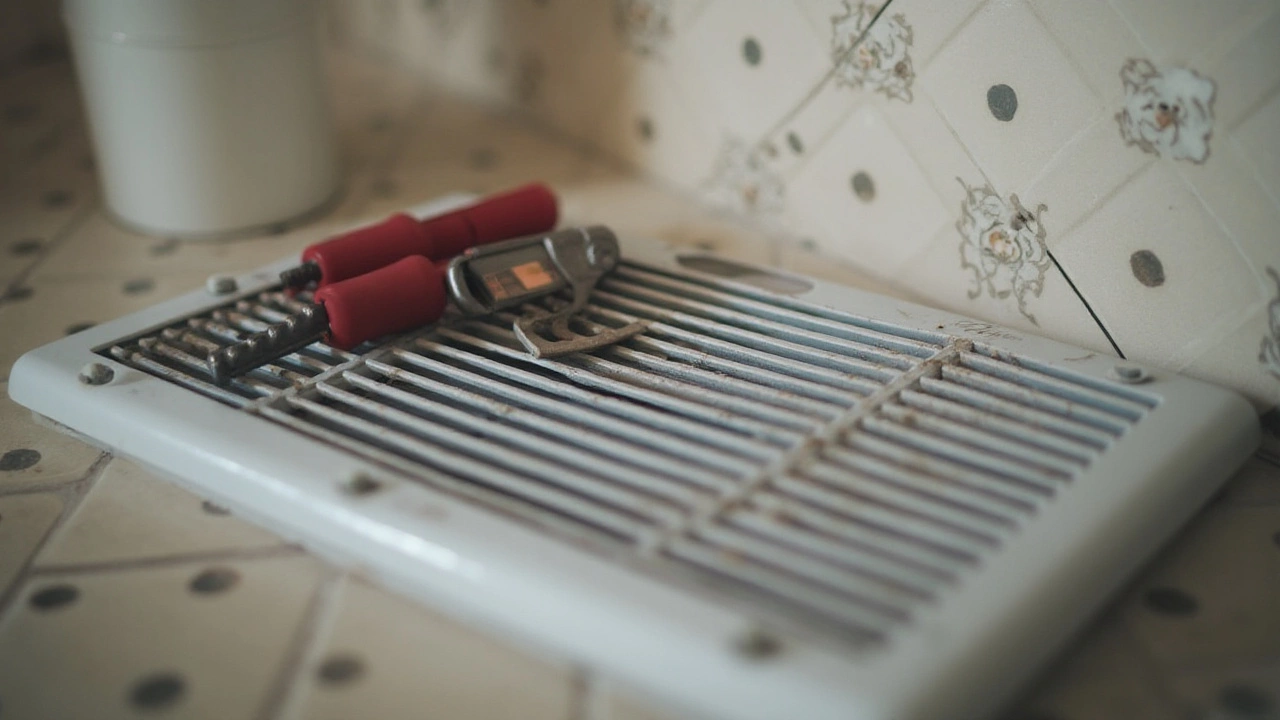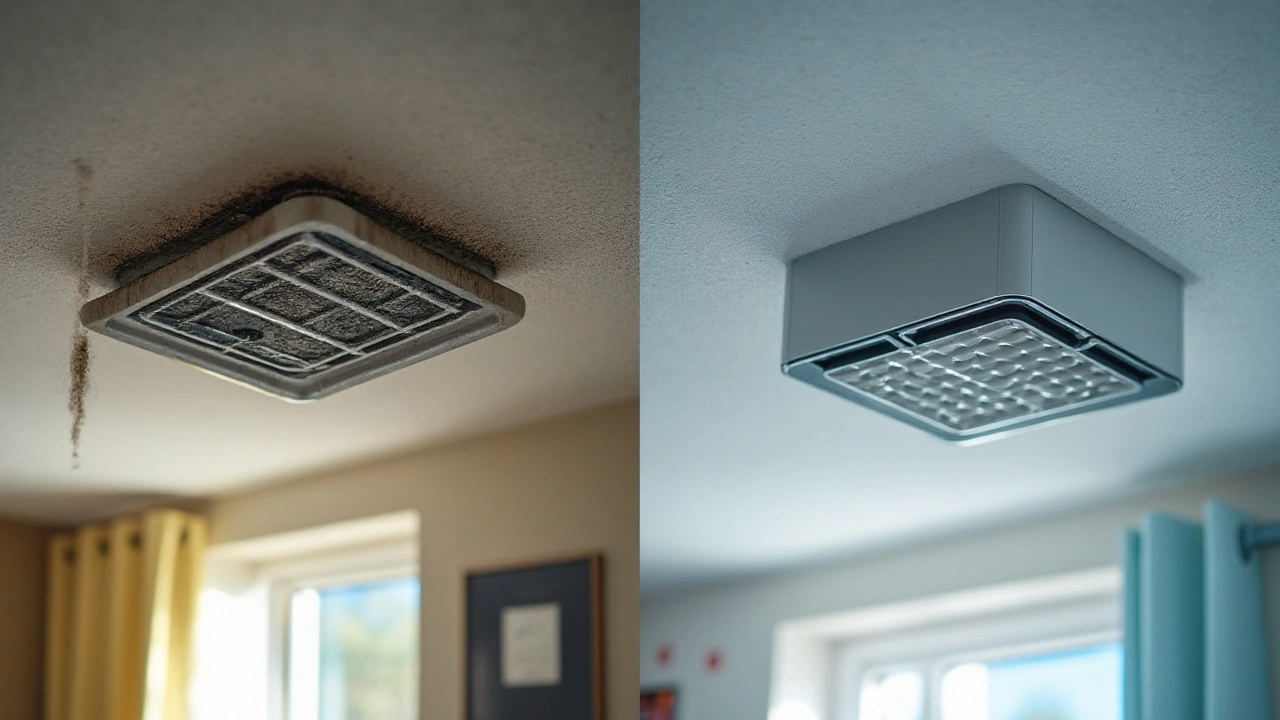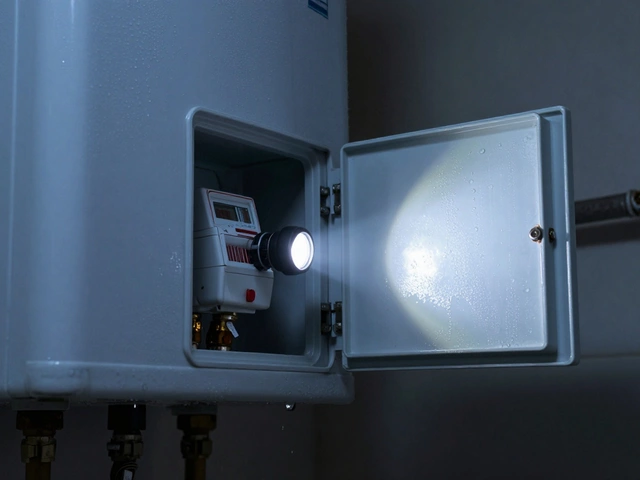Extractor fans often get overlooked in the hustle of daily chores, yet they play a vital role in maintaining a healthy indoor environment. Whether it’s in the kitchen or bathroom, these devices help to keep moisture, odors, and airborne contaminants at bay.
Neglecting extractor fans can lead to inefficiency, decreased air quality, and even structural damage from excess moisture. The decision to service your extractor fan isn't just about cleanliness; it’s about preserving the sanctity of the air you breathe. Let's unwrap the layers behind why regular servicing might just be the breath of fresh air your home needs.
- Understanding Extractor Fans
- Why Regular Servicing is Important
- Signs Your Extractor Fan Needs Servicing
- DIY Maintenance Tips and When to Call a Professional
Understanding Extractor Fans
Extractor fans are a simple yet incredibly effective tool in managing the quality of air in our homes. These fans function by pulling moist or polluted air from the room and pushing it outside. This helps in preventing the build-up of humidity and unwanted odors. You will typically find extractor fans in places where moisture or odors thrive, such as kitchens and bathrooms. Their operation revolves around a relatively small but powerful motor that drives the fan blades, creating a flow of air that effectively evacuates the undesirable elements.
Choosing the right extractor fan requires a basic understanding of its specifications and what the environment demands. Diverse types of fans, such as axial, centrifugal, and inline fans, are designed for different purposes depending on the layout and specific needs of a space. Axial fans are most common for domestic use, especially in situations where the air doesn’t need to travel a long distance to escape, such as through a wall directly to the outside. In contrast, centrifugal fans are better suited for situations that require air to travel through ductwork, providing a stronger force to push the air longer distances.
Installing the right fan can lead to significant improvements in air quality and energy efficiency. Notably, extractor fans have come a long way in terms of technological advancements. Many modern fans now include moisture sensors, enabling them to automatically activate when humidity levels rise past a certain point. This intelligent feature helps prevent dampness, benefiting those who aren’t always around to turn on the fan manually. A well-maintained fan not only ensures its efficiency but also prolongs the life of the installation, contributing positively to air quality management.
According to HVAC expert James Marquette, “The key to healthy living spaces is often hidden in what we ignore—an efficient extractor fan is one of those unseen essentials.”
Most extractor fans function quietly, making them an unobtrusive yet essential addition to your household. With the rise of open-plan living and multi-use spaces, ventilation becomes crucial. Ensuring that the extractor fans in your home work properly and even optimally can save you future expenses related to water damage or poor air quality. It’s not just about moving air; it’s about keeping spaces livable and comfortable.
In some instances, choosing an extractor fan involves considering noise levels, as some fans can create a noticeable hum while operating. There are models designed to minimize sound output, providing a peaceful environment. Energy efficiency is also a consideration, with numerous options focusing on delivering high performance while using less power. As consumers become more environmentally conscious, investing in eco-friendly models that balance power and performance can provide long-term savings and sustainability.
As these fans quietly do their job, it's easy to forget they also require occasional attention. Unlike larger appliances, extractor fans don’t command attention unless they stop working, which is why understanding the importance of their maintenance is equally crucial. This comprehension lays the foundation needed to discuss why consistent servicing can lead to significant, tangible benefits in maintaining a healthy and efficient home environment.

Why Regular Servicing is Important
Caring for your extractor fan, like any integral home appliance, requires an understanding of its value and purpose. Often nestled quietly above kitchen stoves or hidden within bathroom walls, these unsung heroes combat a host of invisible challenges daily. With just a little attention, they repay us by keeping spaces free from lingering cooking odors, preventing mold, and balancing humidity. Imagine a morning where your bathroom mirror isn't fogged after a hot shower—now, that’s an efficiency you can rely on when your extractor fan is in top shape.
When extractor fans aren’t regularly serviced, several issues can crop up over time. For example, dust and grease can clog the motor, leading to reduced efficiency and increased energy consumption. Not only does this escalate utility bills, but it also burdens the fan with the risk of overheating and potential failure. According to a study by the Home Ventilation Institute, a clogged fan can operate at only 60% of its intended capacity. That’s like trying to vacuum with a clogged filter—the effort is futile and can exacerbate the problem.
"A well-maintained ventilation system can improve indoor air quality by more than 50%," says Dr. Marsha Glenn, an indoor air quality specialist. "They mitigate respiratory issues by filtering out pollutants and allergens."To ensure your extractor fan serves its purpose, regularly check for unusual sounds, odors, or reduced air flow. These signs often indicate neglected maintenance needs. The cost of a simple fix now could save hundreds in the long run by avoiding motor replacement or worse, damage from moisture accumulation.
The benefits of regular servicing extend beyond your wallet and into air purity and safety. A fan operating at its best can significantly reduce harmful pollutants and control humidity, cutting down risks associated with mold and mildew—common allergens that also threaten the structural integrity of your home. Enhanced air circulation also deters pests like dust mites and bacteria that thrive in moist environments. By maintaining your fan, you not only prolong the life of the appliance but also protect your living environment. As you contemplate your home's maintenance list, remember that sometimes the smallest of tasks, like fan service tips, make the most impact.

Signs Your Extractor Fan Needs Servicing
Being attentive to the signs of trouble in your extractor fan can save you from larger problems down the road. One of the most telling signs is noise. If your fan starts to sound like an airplane taking off, that's a red flag. Typically, fans are relatively quiet, so when they become loud or begin making unusual sounds, it's time to take a closer look. This noise can be a result of debris buildup or mechanical wear, both of which warrant immediate attention to prevent further damage.
Beyond noise, ineffective air movement is another indicator of potential trouble. A functional fan should efficiently extract steam, smoke, or other airborne particles from your home. If the air feels stagnant or pungent odors linger far longer than they should, it's possible your fan is not operating to its full capacity. This reduction in effectiveness could be due to clogging or an aging motor. Keeping a watchful eye on these immediate impacts can alert you that servicing might be necessary before the fan entirely gives out.
In some instances, you might notice increased humidity in spaces where your extractor fan is expected to shine, such as in the bathroom after a shower. Elevated moisture levels can lead to mold and mildew growth, posing health risks and damaging home structures. When your fan does not manage humidity effectively, it could be that the filters are dirty, or the fan itself is underperforming. They are built to handle specific volumes of air, and compromised components can lead to an air quality concern you can't afford to ignore.
"Regular maintenance of extractor fans is key to maintaining the quality of air within a home. A neglected fan can create more problems than it solves, impacting anything from efficiency to health," says air quality expert Dr. Maria Jensen.
Dirt, dust, and grease accumulation not only affect the fan's performance but can also lead to a loss of energy efficiency. As particles build up on the blades and filters, they create a drag on the mechanics, causing the motor to work harder. This extra effort means more energy consumption, translating to higher electricity bills. Keeping track of your energy usage might give you hints regarding the performance of your extractor fan. Significant spikes in your energy bills can be a subtle indicator that something is awry with your ventilation efforts.
Visual inspection can also be incredibly beneficial. Look out for any visible dirt or damage. If the fan's housing appears dusty or greasy, it’s time for some cleaning. Damaged blades or housing could indicate that internal components are compromised. Continually checking for these signs can help you catch issues early and resolve them with simple servicing or cleaning. Pay attention to the housing materials and ensure there are no rust or corrosion signs, which could indicate deeper inefficiencies lurking beneath the surface.

DIY Maintenance Tips and When to Call a Professional
Maintaining your extractor fan can save you from potential headaches and ensure you're getting the best performance for your investment. Even if you're not a tech enthusiast, there are steps you can take to keep your exhaust apparatus in top shape. But where do you draw the line between a do-it-yourself approach and the need for expert intervention? Here’s a comprehensive guide to help navigate this space.
First, let’s delve into a few basic DIY tips that you can experiment with at home. These tasks, while simple, can have a profound impact. Begin by involving a regular cleaning routine. Dust and grease accumulation is a common problem that can hinder your fan's effectiveness. Use a soft cloth with mild detergent to clean the fan blades, grilles, and any noticeable parts. Remember, a clean fan is an effective fan. Alongside cleaning, check the ductwork connections to ensure they are tight and intact; loose or leaky ducts can reduce efficiency and spread unpleasant allergens.
Another tip is fan calibration. While this might sound complex, it mostly involves ensuring that your fan operates at the designated RPMs. Over time, the settings can veer off-course, leading to reduced airflow and higher energy consumption. Most manuals provided by manufacturers include guidance on how to adjust or check the settings. If not, several trusted resources on the internet provide detailed, model-specific instructions.
But despite your best efforts, there are specific signs that make calling in a professional a wise decision. If you notice unusual noises — such as grinding or whirring — it might indicate a mechanical failure that warrants expert attention. Another indicator can be a consistent reduced performance despite regular cleaning and maintenance routines. Professionals have the right expertise and tools to delve deep into issues that a layperson might overlook.
Recognizing Professional Intervention Points
Beyond noise and performance, there are other instances when it's best to lean on a professional's shoulder. Electrical issues, particularly around wiring and connections, can involve risks that require a trained electrician. Incorrect wiring can lead to short circuits, fires, and other hazards. Additionally, if your home ventilation system suddenly showcases moisture problems or visible mold patches in surrounding areas, this may require a deeper, more technical inspection. Hiring an expert ensures not just the longevity of the fan but your safety as well.
"It’s always tempting to take home repairs into your own hands, but safety should never be compromised. Consult professionals for any issues involving electrical components or unfamiliar territory," advises renowned home safety expert, Robert Chalmers.
Harmonizing DIY efforts with professional assistance increases the lifespan and efficiency of your extractor fan. The dual approach can help keep your living environment in optimal conditions, ensuring each breath you take is of the highest quality. Not only does this mix provide peace of mind, but over time, it proves to be cost-efficient by potentially avoiding future pricey repairs.





